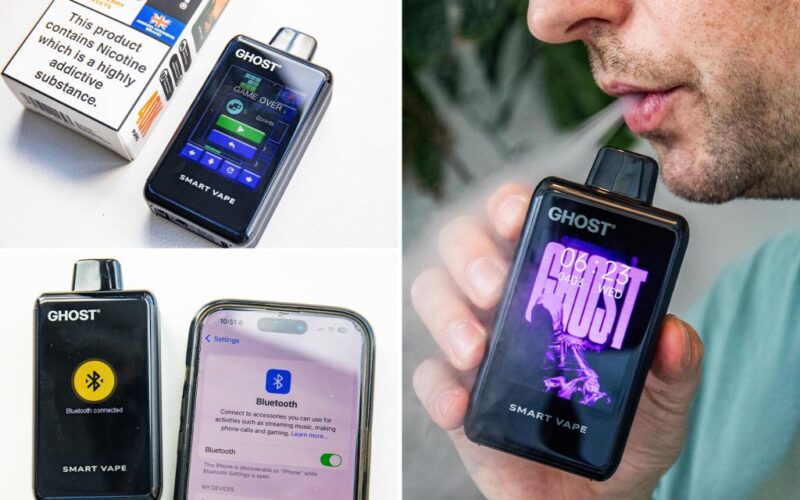Experts have issued a new warning over “dangerous” vapes with built-in video games branded a “flagrant attempt to target kids”.
Described as “smart vapes,” the devices make it possible for users to access pre-installed games, receive and make calls, play music and track fitness.
A number of products are available online, with names such as the Posh Pro MAX, Craftbox V-Touch and Halo SYNIX, and cost around $53.
Experts Artur Galimov, Liam Obaid and Jennifer B. Unger last month expressed concern in a forum post for the British Medical Journal about the devices, with the “integration of smartphone-like designs and functionalities into vaping devices” likely to appeal to youth, as it can help conceal the true nature of the product from adults.
Some of the devices come with integrated speakers, fitness trackers and the ability to enable social media notifications.
They have rechargeable batteries and Bluetooth allowing them to be tracked and connected to smartphones.
The vapes come in fruity and sweet flavours and on average deliver up to 30,000 puffs.
The US Food and Drug Administration (FDA) last October issued warnings to nine online retailers and one manufacturer to stop selling and marketing e-cigarettes with designs and functionalities resembling smart technology.
It said the products are advertised “as having a variety of designs and functions that may appeal to youth, such as the ability to play games, connect to a smartphone, receive text or call notifications, play music or personalize products with custom wallpaper.”
Brian King, the director of the FDA’s Center for Tobacco Products, said: “They’re illegal to sell and a flagrant attempt to target kids.”
But research shows these vapes are available to buy online, with similar models available in the UK for around $53.
Jennifer Unger, a professor of population and public health sciences at the University of South California Keck School of Medicine, is concerned about the rise in “smartphone” vapes and their potential to hook more teenagers and children on nicotine.
She said: “I think they could have a really damaging impact on youth.
“These devices are combining three things that are highly reinforcing: nicotine, video games, and sweet flavours.
“And they’re being packaged in a way that makes them feel safe, fun, and even nostalgic.
“For young people, especially those already exposed to stress or trauma, that’s a dangerous combination.
“And in communities where vaping is already prevalent, this could just make it worse—normalising use, lowering the age of initiation, and making it harder to recognise when someone is vaping.
“When a vape looks like a toy and rewards you for using it, it’s not just a product—it’s a behavioral trap.”
The professor first became aware of the devices in 2023 and 2024 – initially on retailer websites then more widely through social media.
She said: “What’s striking is how they’re being marketed not just as nicotine products, but as fun, trendy gadgets. Some of them look like gaming consoles or phones, and others are actually playable, with retro-style games built right in.
“They’re clearly designed to catch the attention of young people, and the marketing follows that lead—through influencers, unboxing videos, and viral content on platforms like TikTok. It’s not hard to imagine a teenager thinking: ‘This looks cool’ before even realizing it’s a vape.”
The big difference between conventional and “smartphone” vapes, Professor Unger said, was the interactive element.
She said: “A conventional vape just delivers nicotine.
“These newer devices add in gaming elements—sometimes with full-on video games that reward the user with points or prizes every time they take a puff.
“That pairing—nicotine and gameplay—is a concern because it creates a powerful feedback loop. You’re reinforcing the behavior with both a chemical and a psychological reward. It’s not just about vaping anymore—it’s about being entertained while you do it.”
The devices are designed to be “discreet” and “emotionally-rewarding”, she says. “All vapes carry risks, but when you combine nicotine with gaming—especially in a product that looks like a toy or a phone—you’re adding multiple layers of appeal, especially for kids and teens.
“That makes them harder for adults to recognize and harder for young people to quit. So yes, I’m more concerned—not just because of the nicotine, but because of the way these devices are engineered to hook users in more ways than one.”
The professor, who looks into adolescent health behaviours, substance use and tobacco control as research fields, wants a “strong and coordinated” response from the government to tackle these issues.
She said: “At the policy level, we need the FDA to draw a clear line: if a product delivers nicotine, it should not also be a toy or a game. That’s a line we should not be crossing.”
But, she added, schools and parents needed help to identify these new vapes, which look different to traditional ones.
She said: “We need to push back against marketing that targets kids in such deceptive and manipulative ways.
“Education is important—but so is enforcement. These devices don’t just show up by accident.
“They are designed and marketed with intention. And we need to respond with the same level of intention.”








